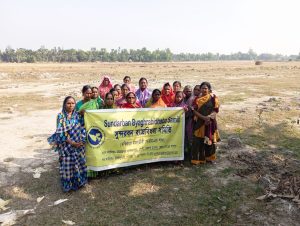In the forests of the Sunderbans in West Bengal, India, limited livelihood options often drive male fishers literally into the jaws of death, with their widows left struggling for survival
By Shilpa Nandy (shilpanandy@yahoo.co.in), Assistant Professor, Khudiram Bose Central College, Kolkata, India, and Advisor, Women’s Wing, Dakshinbanga Matsyajibi Forum, West Bengal, India
The expression ‘Byaghro Bidhoba’, which literally translates to ‘Tiger Widows’, is a term used to refer to women who have lost their husbands to tiger attacks while hunting crabs and fish in the dense forests of the Sunderbans in the Indian state of West Bengal. These are women ostracized and rendered invisible by society, and most people in India are unaware of their plight. What’s worse, these women are victimized and harassed by officials of the Forest and the Fisheries departments when they demand their rights and due compensation.
The struggle for the rights and recognition of the Tiger Widows was taken up in 2017 by the Dakshin Banga Maysajibi Forum (DMF), a registered trade union body representing West Bengal’s fishworkers. A survey by DMF showed that more than 3000 such women reside in the villages of Sudhangshupur, Shantigachi, Jawahar colony, Patharpara, Satjelia Bagmundi, Bidhan colony, Anandapur and Lahiripur in Gosaba block. The survey brought to public light the women’s main demands: to be recognized as ‘Tiger Widows’ as well as to receive the compensation of Rs. 500,000 (approximately, USD 6000) per person, entitled to them by the Indian Wildlife Protection Act (WLPA), 1972. In addition, the women also demanded a monthly allowance of Rs. 3000 (USD 36) to sustain their livelihood.
During the COVID 19 pandemic, with the help of DMF, and with financial assistance from Direct Initiative for Social and Health Action (DISHA), the Sunderban Byaghro Bidhoba Samity (Tiger Widow Association of Sunderban) was formed in 2020 under the leadership of Gita Mridha, herself a ‘tiger widow’. This Association is a community-based body whose primary objective is to work for the betterment and socio-economic empowerment of Tiger Widows. It works to create awareness among women regarding their rights and has successfully mobilized the women to participate in meetings, make deputations at block and district level, and, with the help of DISHA, to also prepare a pond for fishing by the women members of this association.

Over time, the Association has been successful in amplifying the voices of the affected women, who have submitted their demands to the Forest and Fisheries departments at block and district level, and also to the State Commission for Women in West Bengal. It filed about 25 claims from Tiger Widows with the State Women’s Commission, and submitted a writ petition in the High Court of West Bengal. As a result of these struggles, on 18th January 2024, the High Court ordered that a compensation amount of Rupees 500,000 (approximately, USD 6000) each be paid to two widows. Soon after that, in May 2024, two other widows were also awarded similar compensation.
While Gita Mridha is the face of the community and has tirelessly worked to raise public awareness, the collective spirit of its women members is crucial for the Association. The women of the Association say: “Save us, save our community, and save our pride—India’s National Animal, the tiger – but not at the cost of our husband’s lives. We encroach into tiger territory because of hunger, poverty, and lack of livelihood options. We urge the government to think about our loss and pain, and to consider us as human beings, not only as ‘tiger widows’.”
Livelihood in the forests of the Sunderbans is full of danger. Women and men who collect crabs and fishes for a livelihood in these forests are vulnerable to attacks by tigers, snakes and crocodiles. This human-wildlife conflict is part of the lives of these communities and cannot be changed. However, change is certainly possible in terms of how society views these women, and whether state agencies are willing to recognize their rights, enabling them to lead well-supported lives, full of dignity.
Acknowledgement:
Advocate Santanu Chakravorty and Advocate Atindriya Chakraborty for supporting the data and case reports.